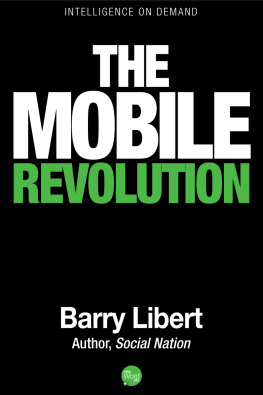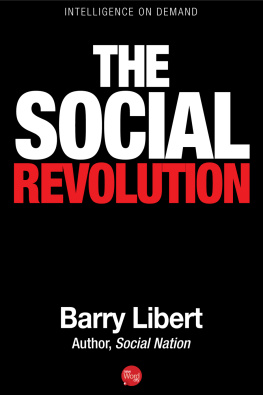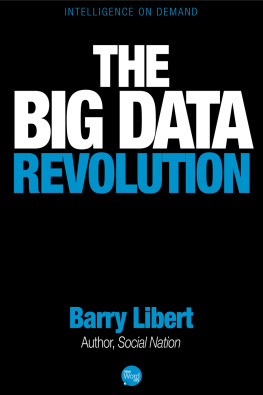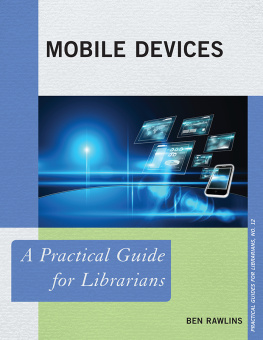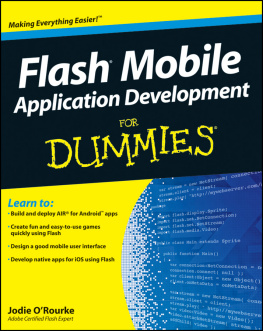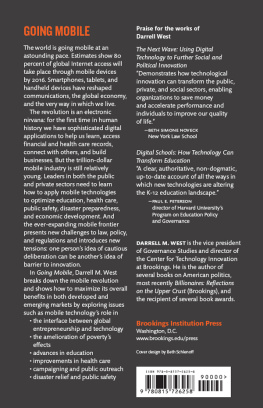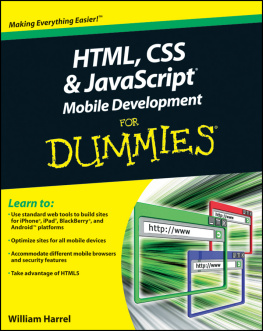Barry Libert - The Mobile Revolution
Here you can read online Barry Libert - The Mobile Revolution full text of the book (entire story) in english for free. Download pdf and epub, get meaning, cover and reviews about this ebook. year: 2013, publisher: New Word City, genre: Business. Description of the work, (preface) as well as reviews are available. Best literature library LitArk.com created for fans of good reading and offers a wide selection of genres:
Romance novel
Science fiction
Adventure
Detective
Science
History
Home and family
Prose
Art
Politics
Computer
Non-fiction
Religion
Business
Children
Humor
Choose a favorite category and find really read worthwhile books. Enjoy immersion in the world of imagination, feel the emotions of the characters or learn something new for yourself, make an fascinating discovery.
- Book:The Mobile Revolution
- Author:
- Publisher:New Word City
- Genre:
- Year:2013
- Rating:3 / 5
- Favourites:Add to favourites
- Your mark:
- 60
- 1
- 2
- 3
- 4
- 5
The Mobile Revolution: summary, description and annotation
We offer to read an annotation, description, summary or preface (depends on what the author of the book "The Mobile Revolution" wrote himself). If you haven't found the necessary information about the book — write in the comments, we will try to find it.
We have entered the post-computer age. The once almighty PC is fast losing relevance for both personal and business use. Whats driving this dramatic change is mobile technology. Today, more people on the planet have mobile devices than have electricity or running water. Here, in this short-form book, technology pioneer Barry Libert describes how the two components of the mobile revolution - personal mobile devices (phones and tablets) and the Internet of Things - are transforming our businesses and our lives.
The Mobile Revolution — read online for free the complete book (whole text) full work
Below is the text of the book, divided by pages. System saving the place of the last page read, allows you to conveniently read the book "The Mobile Revolution" online for free, without having to search again every time where you left off. Put a bookmark, and you can go to the page where you finished reading at any time.
Font size:
Interval:
Bookmark:
This book is one in a series on the technologies that are revolutionizing business today.
Just when we thought statistics had lost their power to shock, along comes this one: More people on the planet have mobile devices than have electricity or drinking water. That means there are untold millions of humans who can text friends, access unfathomable amounts of information, and shop for shoes all from the comfort of their lantern-lit, unplumbed houses. The opportunities for products and profits are astounding. The numbers tell the tale: In 2010, sales of smartphones overtook those of computers. By 2012, global sales of smartphones and tablets totaled 775 million units; sales of PCs were 400 million. Internet analytics leader comScore reports that mobile commerce now accounts for 10 percent of all online sales. Mobile advertising revenue doubled in 2012. And the trend is only accelerating. Simply stated, we no longer need a computer to access the Internet - we can take it with us wherever we go. And that changes everything. In two words: mobile first.
Research from McKinsey & Company further proves the point that this is an unparalleled business opportunity: Its team surveyed more than 200,000 consumers to understand how their habits and spending are changing with technology, particularly when it comes to mobile devices. Among their findings:
- Fifty percent of consumers use their computers and mobile devices to research products theyre considering purchasing.
- Between 20010 and 2012, the number of consumers conducting purchase research via mobile devices has risen from 12 to 21 percent.
- More than 20 percent of shoppers use mobile phones to learn more about products across all categories, and fully 40 percent of them conduct that research in the aisles of the store where they might make a purchase. Their goal: Read reviews and get price comparisons.
- A glimpse into the future: American youths lead digital lives distinct from older consumers: they dont and wont buy PCs or laptops, preferring smartphones or tablets. Landlines are a curious waste to them, as are CDs and most hard-copy media newspapers, magazines, and books. Not surprisingly, they are almost twice as likely to own portable digital devices as older consumers, and they lead in adopting new services such as video chat, social media for many types of communication, and on-demand video.
We have entered the post-computer age. The once almighty PC is fast losing relevance for both personal and business use. Whats driving this change, of course, are mobile technologies. This mobile revolution has two components: personal mobile use, and the Internet of Things. We all (literally) grasp the first component our smartphones and tablets. The second describes the capacity of things - including networks - to gather and communicate data that triggers actions, at times without human participation. These two fascinating, concomitant developments hold enormous promise and profits for businesses everywhere. Simply stated, we are in the midst of a great technological leap that is enabling a wide range of new products and services.
Lets consider some more statistics. Restaurants, stores - in fact, products and services across the board - are increasingly dependent on mobile buzz to fuel their success. Movies live or die based on Twitter comments, often sent during the first showing of a film. People now spend more time on mobile apps than on the Internet - mobile first. The number of Facebook users who visit and post via mobile devices increased from 30 percent to 60 percent between March 2012 and March 2013. Ten percent of all online purchases are now made from mobile devices. By 2015, over 80 percent of the phones purchased worldwide will be smartphones. Mobile advertising revenue doubled in 2012 (and 20 percent of it went to Facebook). According to Enders Analysis, the London-based consultancy, revenue from mobile networks totaled $125 trillion in 2012.
And yet only 37 percent of companies use mobile technology to communicate with their customers, and just 31 percent use it to improve internal interactions. These laggards are placing themselves in a precarious position and denying themselves powerful tools. Mobile technology opens up a whole new world of innovative products and revenue streams. Which leads us to the second component of the mobile revolution.
Enabled by the confluence of mobile, big data, and cloud computing, the Internet of Things is about gathering and sharing information in radical new ways; often this flow is between machines. If, for example, a commuters train to work is going to arrive a half-hour late, this information is relayed by the railroads network to her alarm clock, which, as per her programming, extends her sleep time by fifteen minutes. The clock also turns on her coffee machine fifteen minutes later than it usually does, yet it starts her car at the regular time, giving it an extra fifteen minutes to de-ice from last nights storm - which it learned about from its connection to the weather services network. All of this happens while the clocks owner is sound asleep: networks and things (clock, coffee machine, car) communicating to make her life easier and better. Mobile first.
For companies in all industries, this radical breakthrough in technology - enabled by a global system of Internet-connected networks, sensors, devices, and just plain things - opens the door to an almost infinite number of opportunities. It demands that leaders look at their core offerings through a new prism: one that integrates mobile technology and the Internet of Things into all business processes and strategy, internal and external, but first and foremost into the search for growth. How can a business core offering become part of mobile revolution? For many companies born in the Internet Age, this question is redundant: They live and breathe online. But for many other companies and leaders, it demands redesigning established practices.
The Internet of Things has arrived. More than any other technology, it is driving business strategy. The question for leaders, managers, and developers becomes: where do my products and services fit in? As consumers become more comfortable with, and dependent on, smart things, they will demand them. A product without intelligence built in will have far less chance of success. The relationship between a company and its customers is changing: It isnt selling just a discreet product or service, its selling a portal to the Internet of Things.
To gain a sense of the creativity and entrepreneurship that the mobile revolution has unleashed, lets look at some small companies who are doing big things.
Ninja Block is a sensor device that instantly alerts customers via text message if a pipe has burst or there is unexpected motion in their house. For anyone who has ever suffered water damage, Ninja Block offers peace of mind. It can also be programmed to alert a local plumber, in the event a customer is across the globe fast asleep with his or her mobile device turned off. The day is fast approaching when all new house construction will tap into mobile technology. Partnerships between builders and national and regional service providers are on the horizon, as companies vie to be linked into houses software. Merry Maids, HVAC providers, Roto Rooter, appliance manufacturers, and other companies could gain market dominance by becoming the default go-to in millions of smart homes.
On the same topic but a more tragic note, the recent collapse of a garment factory in Bangladesh, the deadliest industrial accident in history, has focused attention on the shoddy building standards in many developing nations. Smart Structures SmartPile technology can help. It uses wireless sensors embedded in concrete foundation piles to monitor the strength and integrity of a structure and relay any warning signs to inspectors and building owners. Since they remain in the concrete, SmartPile sensors are effective not only during construction but for the life of the building.
Font size:
Interval:
Bookmark:
Similar books «The Mobile Revolution»
Look at similar books to The Mobile Revolution. We have selected literature similar in name and meaning in the hope of providing readers with more options to find new, interesting, not yet read works.
Discussion, reviews of the book The Mobile Revolution and just readers' own opinions. Leave your comments, write what you think about the work, its meaning or the main characters. Specify what exactly you liked and what you didn't like, and why you think so.

